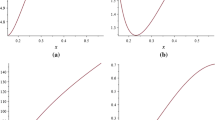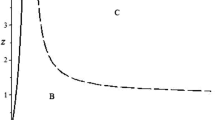Abstract
We consider an asymmetric Cournot duopoly with firms facing linear Leontief technologies. A pollutant is generated proportional to the quantity of output. The government may regulate the firms by imposing Pigouvian taxes or by issuing a number of tradeable permits. We characterize the optimal tax as well as the optimal permit policy as a function of a critical damage parameter. It turns out that in general neither the social optimum is enforceable, nor is one of the two policies always superior to the other. For a wide range of parameters, however, the permit policy leads to a higher welfare.
Similar content being viewed by others
References
Barnett, A. H. (1980): “The Pigouvian Tax Rule under Monopoly.”American Economic Review 70: 1037–1041.
Baron, D., and Myerson, R. B. (1982): “Regulating a Monopolist with Unknown Costs.”Econometrica 50: 911–930.
Baumol, W. J., and Oates, W. E. (1988):The Theory of Environmental Policy. Cambridge, MA: Cambridge University Press.
Cropper, M. L., and Oates, W. E. (1992): “Environmental Economics: A Survey.”Journal of Economic Literature 30: 675–740.
Ebert, U. (1992): “Pigouvian Taxes and Market Structure: The Case of Oligopoly and Different Abatement Technologies.”Finanzarchiv 49: 154–166.
Hahn, R. (1984): “Market Power and Transferable Property Rights.”Quarterly Journal of Economics 99: 753–765.
Levin, D. (1985): “Taxation within Cournot Oligopoly.”Journal of Public Economics 27: 281–290.
Malueg, D. A. (1990): “Welfare Consequences of Emission Trading Programs.”Journal of Environmental Economics and Management 18: 66–77.
Requate, T. (1992): “Pollution Control under Imperfect Competition via Taxes or Permits: Cournot Duopoly.” IMW-Discussion Paper No. 212, Institute of Mathematical Economics, University of Bielefeld.
Spulber, D. F. (1985): “Effluent Regulation and Long-run Optimality.”Journal of Environmental Economics and Management 12: 103–116.
Tietenberg, T. H. (1985):Emissions Trading: An Exercise in Reforming Pollution Policy. Washington, D.C.: Resources for the Future.
Ulph, A. (1992): “The Choice of Environmental Policy Instruments and Strategic International Trade.” InConflicts and Cooperation in Managing Environmental Resources, edited by R. Pethig. Berlin-Heidelberg-New York-Tokyo: Springer.
Wang, J. (1991): “Emission Tax vs. Output Tax as an Environmental Instrument under Market Imperfections.” Discussion Paper No. 446-91, Department of Economics, University of Mannheim.
Weigel, O. (1992): “Schadstoffvermeidung im Oligopol — Eine numerische Untersuchung.” Diploma Thesis, Institute of Mathematical Economics, University of Bielefeld.
Weitzman, M. L. (1974): “Prices vs. Quantities.”Review of Economic Studies 41: 477–491.
Author information
Authors and Affiliations
Additional information
This paper has been written for the most part during a visit to the California Institute of Technology, Pasadena, California. The author would like to express his gratitude to the Division of the Humanities and Social Sciences for its hospitality, to P. Chander, W. Trockel, the participants of seminars at California Institute of Technology, State University of New York at Stony Brook, Purdue University, the universities of Bielefeld, Dortmund, and Mannheim, and two anonymous referees for their helpful comments, and especially to Jeanne Netzley for her TEX-nical support at Caltech. Financial support by the state government of Nordrhein-Westfalen (von Bennigsen-Foerder Preis) is gratefully acknowledged.
Rights and permissions
About this article
Cite this article
Requate, T. Pollution control in a Cournot duopoly via taxes or permits. Zeitschr. f. Nationalökonomie 58, 255–291 (1993). https://doi.org/10.1007/BF01235250
Received:
Revised:
Issue Date:
DOI: https://doi.org/10.1007/BF01235250




